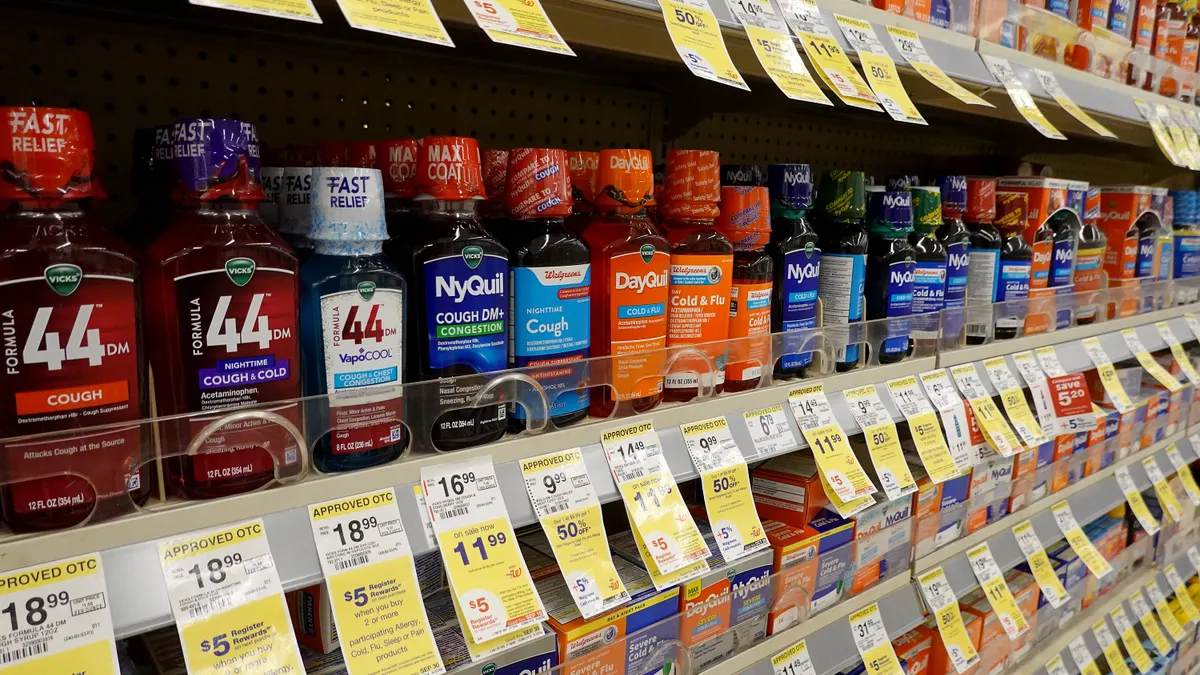“Safe and effective.” That’s the FDA standard for drugs, and over the years, a handful have been pulled from the market due to safety concerns, including the heartburn drug Zantac in 2020.
Now, perhaps for the first time, the FDA is considering pulling a drug from the market not because it isn’t safe, but because research has shown it doesn’t work.
Phenylephrine has been sold as a decongestant for decades and is an ingredient in OTC medicines like Sudafed PE, Benadryl Allergy D Plus Sinus, and Vicks DayQuil Cold and Flu Relief. But last month, the FDA’s independent Nonprescription Drugs Advisory Committee unanimously agreed that phenylephrine doesn’t actually work as a decongestant when taken in its oral form.
The committee didn’t call phenylephrine’s safety into question. It also didn’t question the effectiveness of phenylephrine as an active ingredient in nasal sprays.
But scientists have been casting doubt on the efficacy of oral phenylephrine as a decongestant for years. For instance, a 2006 study found that at its approved dose, the ingredient is “unlikely to provide relief of nasal congestion.” Another study in 2015 found it to be no better than a placebo, and scientists have openly questioned why it’s still being sold as a decongestant.
“They sold, effectively, snake oil. It just doesn't work.”

Adam Levitt
Founding partner, DiCello Levitt
Despite this evidence, phenylephrine continues to be a familiar ingredient in OTC cold medicines as an alternative to pseudoephedrine, which is restricted behind pharmacy counters because it can be used to make methamphetamine.
Now, the FDA will decide whether to put the advisory committee’s recommendation into action and remove oral phenylephrine from the market.
In the meantime, those products remain on pharmacy shelves. In fact, the Consumer Healthcare Products Association trade group said as much in a statement about the recommendation, reiterating that the “regulations for phenylephrine (PE) remain unchanged, and there is no change in the availability of products containing PE on store shelves. The NDAC vote was a non-binding suggestion for the FDA to consider. Consumers can maintain their confidence in the fact that these medicines continue to be recognized as safe and effective by FDA.”
Legal action
Two days after the committee members cast their votes, companies including GlaxoSmithKline, Procter & Gamble, Walgreens and Kenvue (formerly Johnson & Johnson’s consumer healthcare division) were hit with a class action lawsuit.
The lawsuit alleges the companies defrauded consumers by selling a product they knew didn’t work. Unlike many other pharma lawsuits, it’s not a labeling or personal injury case, said Adam Levitt, founding partner of DiCello Levitt, one of the firms that filed the lawsuit. It’s a false advertising case.
Levitt believes the case represents “a hugely profitable violation of the public trust,” noting that sales of these products reached almost $1.8 billion last year.
“They sold, effectively, snake oil,” he said. “It just doesn't work.”
But did the companies know that or believe differently? That might be the billion-dollar question.
The Consumer Healthcare Products Association maintains that the FDA committee’s findings are “at odds with the numerous clinical trials and previous regulatory determinations affirming oral PE as a safe and effective decongestant at its labeled dose.” The association declined to comment further.
Levitt disagrees.
“We certainly know that certain companies knew for years, and I’d like to think that we're going to find out in discovery that every single one of these companies knew for years,” he said.
Further ramifications
There are a lot of steps between now and potential removal of phenylephrine, including a proposed order from the regulator, a public comment period and a final order. If that’s the case, the FDA said it would work with companies to reformulate those products as needed.
Removing it could be unprecedented. Leslie Hendeles, a professor emeritus at the University of Florida’s College of Pharmacy and an FDA consultant, told Time Magazine, “in 50 years, I don’t ever remember a drug being removed from the market because it wasn’t effective.”
But if it happens, it would set a precedent and prompt regulators to look at other ingredients with a fresher eye.
In the Time interview, Hendeles pointed to dextromethorphan, a cough suppressant in Robitussin, and guaifenesin, an expectorant in Mucinex, as ingredients that literature suggests don’t have much of a clinical benefit. For instance, a 2014 study showed no difference in sputum volume between guaifenesin and a placebo.
Until the FDA’s decision, though, products containing oral phenylephrine as a decongestant remain on store shelves with the agency’s “safe and effective” endorsement.
















